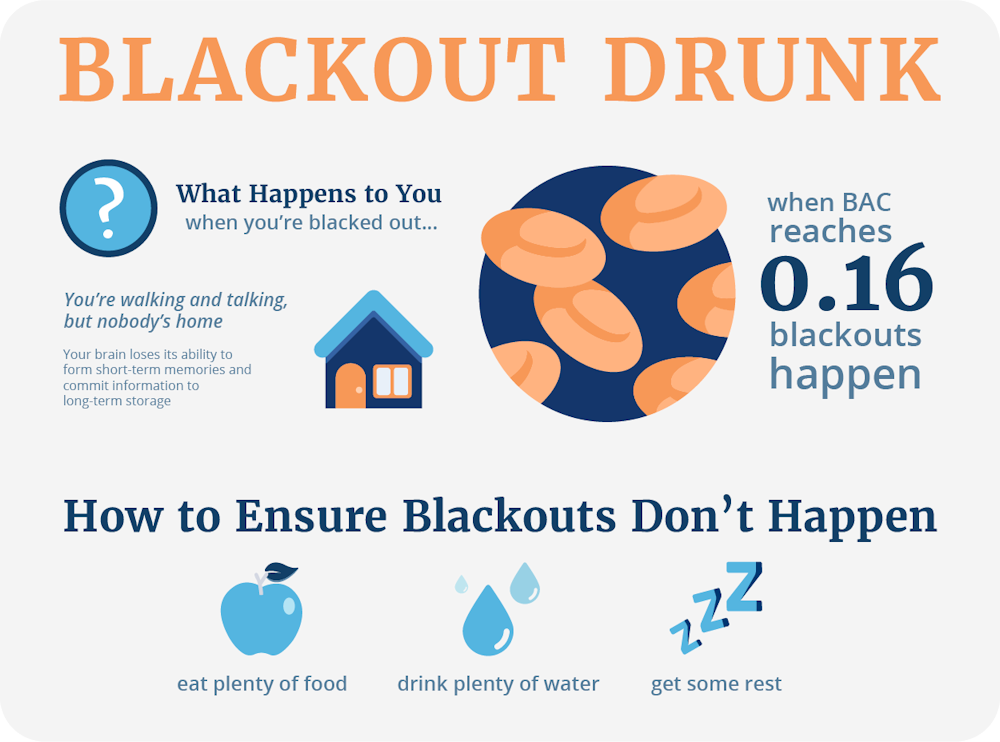Blackout Drunk
Getting blackout drunk is undoubtedly a sign of alcoholism. However, the number of drinks it takes to get to that point varies according to the individual. Regardless of whether it takes three drinks or ten, there’s no doubt that blacking out is a detrimental result of drinking far too much.
Suffering from a blackout is no walk in the park. In fact, those who suffer are often enslaved to the magnetic nature of the substance. Because of this, drinking becomes the person’s priority number one. Blackouts are born as a direct result of the insatiable hold alcohol has on a person. However, it is worth mentioning that not everybody who suffers from a blackout also suffers from alcoholism.
What Happens When You Are Blackout Drunk?
According to Medical Daily, when you black out, “your brain loses its ability to form short-term memories and commit information to long-term storage.” In other terms, you are walking and talking, but nobody’s home. This is why people who are drunk tend to repeat the same things over and over, or forget something they did and try to do it again a few minutes later. The next morning they’ll wake up with no recollection of what actually happened.
Binge drinking is one of the biggest causes of blacking out. Binge drinking is defined by the National Institute on Alcohol Abuse and Alcoholism as “rapid alcohol consumption that raises blood alcohol concentration (BAC) to 0.08 percent or more.” This is the legal limit in most states. This is the point where blackouts are possible, especially for people with a lower tolerance.
At 0.16 and higher BAC, blackouts are much more likely to occur.
Blackouts happen to some people more so than others depending on genetics, mood disorders, and medical conditions. It can also matter what you ate that day, and certainly if you are taking any medications. ALWAYS consult with a physician before drinking with medication because this combination can be deadly.
Short and Long-Term Effects

Have you ever seen someone look for something in the fridge, forget and look for it a few minutes later when they are drunk? Or someone who is constantly misplacing their beer even though they had it in their hands a few minutes before? This is because a blackout is blocking memory receptors in the brain to help them know what happened in the last few minutes.
As far as long-term memory is concerned, there are people who wake up in the morning after a night of drinking with no recollection about what happened. This is a rather terrifying experience. It is impossible to remember everything that happened the night before a blackout.
As far as the long-term effects of frequent blackouts, it does have an impact. It can lead to issues with memory loss and retention. There is evidence to suggest that it can also be a contributing factor to Alzheimer’s and dementia.
Alcohol and Memory Loss
Those who have suffered from blackouts in the past are more likely to forget very simple things than those who don’t drink at all. Alcohol creates a barrier to converting short-term memory to long-term storage in the brain. Someone impacted in such a way just can’t remember things the right way. This is most obvious when a person is drunk, but blackouts over a long period of time could make memory loss obvious even when somebody is sober.
Heavy drinking plays a large role in memory loss and retention, and it can also cause a particular region of the brain known as the hippocampus to become smaller and cause changes to neurons within that region. The Hippocampus is the center of emotions and memories. People who drink heavily regularly can damage the Hippocampus. As a result, brain cells shrink.
Brain chemicals are vulnerable to even the smallest amounts of alcohol. These chemicals are referred to as Glutamate. Glutamate has an impact on memory and often is the cause for temporarily blacking out. This also has an impact on day-to-day functions such as paying bills on time, showing up late to meetings, or forgetting about appointments that have been set. In fact, people who suffer from blackouts are more likely to suffer from these symptoms than somebody who does not.
Blacking Out in Social Environments
In a decent social environment, it is likely that people don’t plan on blacking out. However, intention and followthrough are two completely different things. Alcohol has the ability to impair a person’s judgment or memory even after a few drinks. The more someone drinks, the more impaired they become.
When alcohol is consumed quickly without having eaten anything all day, blackouts can become that much more likely. Not only this, but the potential for memory loss grows even more. All of that to say there could be any number of reasons someone blacks out without having intended to do so.
Interestingly enough, blackouts are more common among drinkers in social environments. This should motivate casual drinkers to be more aware of gradual, acute intoxication. Blackouts are no respecter of good intentions, nor do they respect age or different life circumstances. In fact, a person who is casually drinking could be tempted the least of anybody to abuse alcohol and still potentially blackout. It is imperative that people undergo proper precautions when drinking even in the most relaxed of environments.
How to be Sure it Doesn’t Happen Again
Some reports have shown that avoiding alcohol altogether from the time-span of a few months to a year may help the brain function normally again. Abstinence also helps reverse the negative impact blackouts have on a person (i.e. memory loss, problem-solving, retention, etc.). For somebody who blacks out more frequently than others after only drinking a small portion, abstinence from alcohol might be the best way to treat it. However, there are more strategies than just abstinence.
Food
In the human body, the stomach is a very small muscle and has minimal capacity in absorbing liquids. The small intestine, however, has much more room to absorb liquids because the small intestine is covered by villi; villi increase the surface area of a membrane. The key is in the valve between the stomach and the small intestine. When someone eats, they allow that gap to close so that the alcohol takes a lot longer to move into the person’s bloodstream.
Water
The more alcohol somebody ingests, the more likely they are to become dehydrated. When people are well-hydrated, they don’t drink alcohol as quickly as they do when they aren’t. This encourages the person to take sips of their beverage less often.
Rest
Not enough is said about rest and the impact that exhaustion has on the body. Blackouts become more likely if somebody is sleep-deprived. Making a habit of resting well for every day of someone’s life can help them avoid blackouts.
Cutting Back
The more straight shots of alcohol a person consumes, the more likely they are to blackout. Cutting back on the amount of alcohol in a drink helps them slow down their consumption. Changing up the ratio of non-alcohol to alcohol in a drink could mean the difference between a fun time and a bad morning as a result of a blackout.
Pacing
The faster someone drinks, the more likely they are to become drunk quicker. However, it won’t happen gradually. Drunkenness is more likely to sneak up on someone if they’re not careful enough in their pacing. One way to slow down the pace is to come up with a ratio for non-alcoholic drinks to alcoholic drinks. For example, every glass of beer equals two glasses of water.
Discovery Wants to Help You
Discovery Health is committed to helping those who struggle with alcoholism and blackouts. Our team wants to provide their patients with the utmost care so that we can guide them to a place of stability. The last thing we want is for somebody to blackout and have long-term damage without getting the help they deserve. These kinds of services require the care of medical professionals that know how to treat the effects of blackouts and alcoholism.
It is so important to us that we stand with those who want to be free from the impact blackouts have had on their lives. We want to help them function healthily in their day-to-day lives. However, treating patients can become difficult due to the uniqueness of each individual. There is no one-size-fits-all formula for treatment, but thankfully, our treatment options at Discovery are equipped to handle the most complex of circumstances.
Every patient who walks through our doors deserves a life of sobriety and stability. Regardless of how long they spend their time here, patients can be absolutely certain that they are being treated with the best care available. If you or a loved one are suffering from blackouts and are seeking help, ask us about our treatment options. You can contact us here.
Dr. Joseph Ranieri D.O. earned his BS in Pharmacy at Temple University School of Pharmacy in 1981 and His Doctorate Degree in Osteopathic Medicine at the Philadelphia College of Osteopathic Medicine in 1991. He is Board Certified by the American Board of Family Medicine and a Diplomate of the American Board of Preventive Medicine Addiction Certification. Dr. Ranieri has lectured extensively to physicians, nurses, counselors and laypeople about the Disease of Addiction throughout New Jersey and Pennsylvania since 2012.




